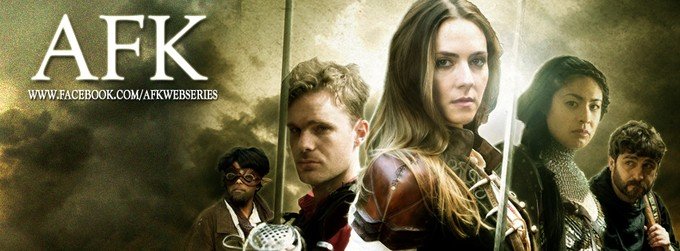Web series AFK receives green light from fans after round two of crowd funding

Imagine waking up in the middle of a forest, dressed in fantasy-setting garments, and with no idea what’s happening. You also happen to look like a petite female warrior, when in fact you’re just a guy that wants to look at a nice (virtual) ass. This is the premise of AFK: Gaming Web Series, which traps six gamers of an online game in the world and bodies of the characters they play.
The series is suppose to be a hilarious (and occasionally serious) look at what would happen to a group of modern day gamers if they were suddenly forced to inhabit the virtual world they’ve been playing in. It’s a world where modern conveniences and technologies don’t exist. Gender roles and stereotypes are being upset. And it’s an insight into the world of gamers and how they operate.
Yet more importantly, it’s also a crowdfunding learning curve for series creator Peter Haynes, who only managed to achieve the required funding to produce the series after a second go on KickStarter.

Peter Haynes (right) and actress Mia Pistorius (middle)
“KickStarter is a real learning process,” Haynes says. “It’s not just ‘oh, I’ve got a great idea, I’m going to put it on KickStarter, and people will give me money’. It’s really not as simple as that.”
Haynes had reached a respectable amount on the first campaign, but he soon realised the existing fan base he had created on Facebook wasn’t going to be enough. It also didn’t help when the original campaign amount – $40,000 – was eventually recognised as “too ambitious” for the project.
“So when we came back for the second time, we revised our total, revised our number of episodes – it’s gone down from 10 episodes to six, plus the pilot. So that makes seven [episodes].”
It’s meant achieving $16,531 for a revised $15,000 KickStarter campaign, based on not only the feedback and number of fans they have on Facebook, but also the promotional work they’ve done at events such as the Armageddon Expo, a commercial science fiction and comics convention.
Haynes disagrees with the notion that crowdfunding is “taxes on friends”. Instead it’s more like “giving people the option to watch what they want to watch,” he says.
“We’re saying, ‘hey, we want to make this. If you want to give us your money, great! If you don’t, that’s fine too’. The people who want to see it and are keen on it, and have been quite passionately supporting it, have provided us with money. We’re not forcing them to do that; they’re doing it because they want to.”
Streaming all that content
Haynes says his decision to go down the route of crowdfunding is a reflection of how consumers are starting to shift the way they consume media. Traditional modes of television means restraints imposed by production companies and investors of the project. As such, when the investment is from the consumer base, it means retaining authoritarian control by the creative team.
And while Haynes says putting his content on streaming services such as Netflix, Quickflix, or Lightbox is still up in the air at the moment – he’s only just finished the pilot and the KickStarter campaign – there have been interested parties and talks are underway.
“The idea is that it’s going to be free online [on YouTube], because that’s what people have been donating for,” Haynes says. “Some of the biggest web series on YouTube are profitable. It has to be a lot of views before they’re profitable, but it is a viable thing to put a web series online [and be paid].”

The World Internet Project (WIP), a collective intellectual endeavour by a number of academic institutions to study the internet’s impact on society, showed that as of the last report released in 2013, almost 70 percent of New Zealand’s internet users watch TV shows online at least occasionally.
TV and internet were also shown to be equally important sources of entertainment for the public, with 62 percent of users downloading or streaming video at least occasionally.
It’s these statistics that proved to production companies providing streaming content is a good idea; especially in light of research that says legal alternatives means reduced content piracy.
Original content produced by the likes of Netflix and Amazon (yes, the e-commerce company) such as House of Cards and Alpha House, respectively, are receiving rave reviews online. Their successes have become testament to other production houses such as HBO, which announced a stand-alone internet streaming service next year back in October. Its popular series Game of Thrones attracted 18.6 million viewers for its fourth season alone.
It’s the likes of pioneering YouTube series H+ that have made sure web streaming is a viable option – though it does boast Bryan Singer (Superman Returns, X-Men series) at the helm.
And while it’s the Hollywood blockbuster version of a web series, it has paved the way for Haynes and where he hopes to take his project.
“Obviously we try to make it look as good as possible, but we’re not going for the big action set pieces or big special effects. We’re keeping it quite low-key, quite low-scale, but still exciting and interesting enough to keep people watching.”




